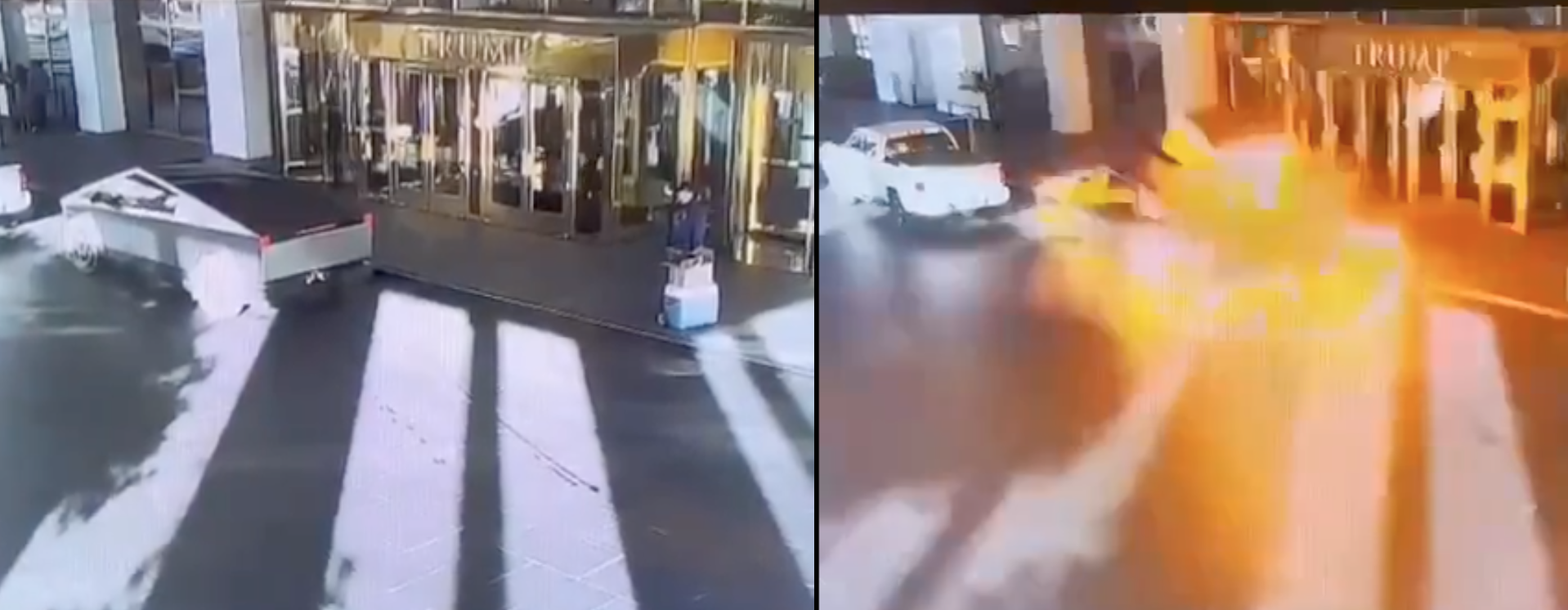
Capabilities used in or justified by extreme circumstances often become commonplace and are used for much more mundane things in the future. And so the remote investigative actions taken by Elon Musk in Wednesday’s Cybertruck explosion in Las Vegas are a warning and a reminder that Tesla owners do not actually own their Teslas, and that cars, broadly speaking, are increasingly spying on their owners and the people around them.
After the Cybertruck explosion outside of the Trump International Hotel in Vegas on Wednesday, Elon Musk remotely unlocked the Cybertruck for law enforcement and provided video from charging stations that the truck had visited to track the vehicle’s location, according to information released by law enforcement.
“We have to thank Elon Musk specifically, he gave us quite a bit of additional information in regards to—the vehicle was locked due to the nature of the force from the explosion, as well as being able to capture all of the video from Tesla charging stations across the country, he sent that directly to us, so I appreciate his help on that,” Clark County Police sheriff Kevin McKahill said in a press conference.
The fact that the CEO of a car company or someone working on his behalf can—and did—remotely unlock a specific vehicle and has the means of tracking its location as well as what Musk described as the vehicle’s “telemetry” is not surprising given everything we have learned about newer vehicles and Teslas in particular. But it is a stark reminder that while you may be able to drive your car, you increasingly do not own it, that the company that manufactured it can inject themselves into the experience whenever it wants, and that information from your private vehicle can be provided to law enforcement. Though Musk is being thanked directly by law enforcement, it is not clear whether Musk himself is performing these actions or whether he’s directing Tesla employees to do so, but Tesla having and using these powers is concerning regardless of who is doing it.
With Teslas, it is not just remote unlocking and tracking ability that shows who holds the power here. It’s the fact that Teslas are incredibly difficult for independent repair shops to fix. It’s the subscription “Premium Connectivity” entertainment features. It’s the fact that entire feature sets like “full self driving,” which are built into the car’s hardware, can only be unlocked with expensive software purchases or subscriptions. It’s the fact that random Tesla workers spied on customers using onboard cameras and shared them with each other. It’s the fact that cops see Teslas near crime scenes as potential sources of video footage.
It’s the fact that “full self-driving” is being used to train Tesla’s broader self-driving program, which is a software product and which will inevitably become some sort of revenue share or rideshare robotaxi product. All of these “features” are something that is fundamentally incompatible with the concept of individual ownership, and a shift in what we traditionally think of when we purchase a car (or any other product).
We still don’t know that much about Wednesday’s explosion, but Musk and police are operating under the current assumption that this was an intentional car bomb. Under such extreme circumstances, it’s easy to look at the way Musk is proactively helping the police and say that it’s the right thing to do, or a normal thing to do. But surveillance and data collection and sharing that is justified or trialed in extreme situations one day becomes commonplace for more run-of-the-mill situations later on. In the aftermath of the San Bernardino mass shooting, Apple famously refused to help law enforcement break into the shooter’s iPhone or undermine its security because doing so would lead to less privacy for everyone. The type of third-party hacking capability that the FBI used to eventually get into the shooter’s iPhone in what was then an extreme occurrence is now a capability that even local police have and is used every single day.
We already know that cars are increasingly spying on their drivers and the world around them, and that this data is not just being shared with law enforcement, it’s being used to make money from customers. Last year, the New York Times’s Kashmir Hill did a series of investigations about how connected cars record telemetry about their drivers and shares it with data brokers and insurance companies. This is not just a Tesla problem. But the ability for a vindictive, politics-obsessed CEO to control and monitor the cars his company makes is particularly chilling.


